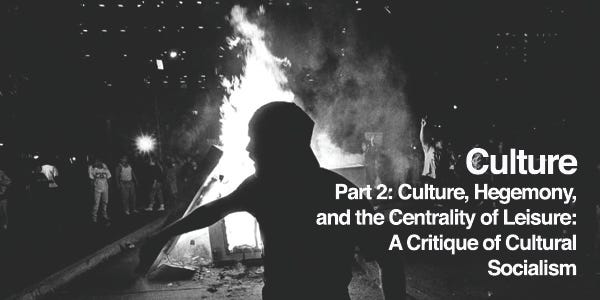Culture
Part 2: Culture, Hegemony, and the Centrality of Leisure: A Critique of Cultural Socialism
Morning Comrades.
The preceding section advanced the thesis that culture is not an independent or purely ideological phenomenon, but rather is rooted in the material distribution of leisure — the disposable time remaining after the satisfaction of immediate subsistence needs. Drawing on theorists such as David Harvey, Kathi Weeks, and Moishe Postone, the argument emphasised that under capitalism, the organisation of labor time fundamentally conditions not only economic relations but also the capacity for cultural production, participation, and development.
Rather than conceptualising culture as a domain of autonomous creativity or as a mere reflection of dominant ideologies, Part I asserted that culture must be understood materially: as a function of how time, labor, and energy are allocated across society. The capitalist expropriation and commodification of leisure time restrict the production of culture to privileged classes, thereby reinforcing inequality not only in wealth but also in the sphere of meaning, creativity, and social reproduction.
From this analysis, it follows that any project aiming at cultural egalitarianism must begin by confronting the capitalist domination of time itself. The universal expansion of leisure, secured through a radical reorganisation of labor and production, emerges as the necessary precondition for the democratisation of cultural life.
Without such a material foundation, cultural reforms risk remaining superficial, accessible only to those already freed from the compulsions of wage labor.
This materialist reinterpretation of culture sets the stage for a critical engagement with existing Marxist theories of cultural struggle, particularly those advanced by thinkers like Antonio Gramsci and Raymond Williams, whose contributions, while invaluable, often understate the structural necessity of leisure for mass cultural empowerment.
Part II will therefore proceed to situate this leisure-centred analysis within a broader critique of "cultural socialism," arguing for the re-centring of time, labour, and leisure as primary revolutionary concerns.
The relationship between culture and socialism has been a major concern for Marxist theorists throughout the twentieth and twenty-first centuries. Among the most influential were Antonio Gramsci, who theorised cultural hegemony, and Raymond Williams, who developed the concept of cultural materialism. Both emphasised that culture is not merely a reflection of economic conditions but an active terrain of class struggle.
While their insights were groundbreaking, this essay will argue that much of "cultural socialism" — particularly as elaborated by Gramsci and Williams — risks overemphasising the role of ideological struggle at the expense of addressing the material basis of culture: leisure. Without the liberation of disposable time for the masses, cultural transformation remains a project of elites, limited in scope and deeply vulnerable to capitalist co-optation.
Thus, building on the arguments of Part I, this essay contends that the universal democratisation of leisure remains the prerequisite for any genuine socialist culture.
Keep reading with a 7-day free trial
Subscribe to Black Lodges to keep reading this post and get 7 days of free access to the full post archives.




